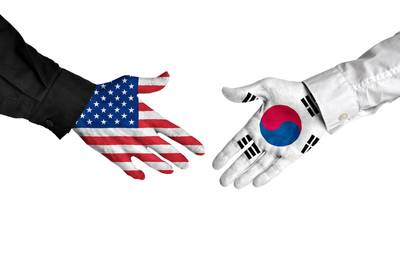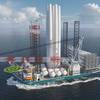South Korea, U.S. Alliance will Thrive Under Trump, says Foreign Minister
As world-reaction to Donald Trumps presidential win continues to come in, South Korean Foreign Minister Cho Tae-yul said he is "strongly confident" the South Korea-U.S. alliance will continue to thrive under the incoming U.S. administration of President-elect Donald Trump.
While there are many tendrils to the economic and defense alliance, in particular in recent years, South Korea's world-class shipbuilders have drawn increasingly close to their U.S. counterparts, as the U.S. aims to increase the production and productivity of its military shipbuilding and ship repair facilities.
"To be sure, concerns have been raised in many circles about the implications of the election outcome on U.S. relations with its allies," Cho said in recorded remarks to a forum hosted by Washington's Center for Strategic and International Studies.
"But I'm strongly confident that the Korea-U.S. alliance will continue to thrive and reach new heights in the coming years," he said.
Outgoing U.S. President Joe Biden met with Japanese and South Korean leaders on Friday as they sought to cement their diplomatic progress ahead of the new Trump administration that many fear could upend alliances worldwide.
Getting South Korea and Japan to work together is considered one of the diplomatic achievements of Biden's soon-to-end four-year term as president. In his 2017-21 first term, Trump pressed Tokyo and Seoul to pay more for the U.S. forces they host, which in Japan include amphibious units and naval warships that Washington could deploy to defend neighboring Taiwan from any attack by China.
Trump's allies in June assured officials in Japan and South Korea that he would support deeper three-way ties, sources have told Reuters.
Outgoing Deputy Secretary of State Kurt Campbell, who has led Biden's Indo-Pacific policy, told the same forum that U.S. Secretary of State Antony Blinken had been in consultation with Senator Marco Rubio, Trump's nominee to take over as America's top diplomat, about which parts of existing strategy deserved continued engagement and investment.
Referring to the trilateral relationship, Campbell said: "I would put this very much at the extreme top of the list."
Cho said his interactions with a wide range of key interlocutors in the United States had left him as convinced as ever that American support for the Korea-U.S. alliance cuts across U.S. party lines.
He said the need to strengthen extended nuclear deterrence against the threat posed by North Korea was well understood and support ran deep for further expanding cooperation in areas including cyberspace and outer space, and for growing the trade and investment partnership to include shipbuilding and servicing, semiconductors, AI and nuclear domains.
"Second," he added, "the (South Korea President) Yoon Suk Yeol administration's determination to assume roles and responsibility commensurate with Korea's strength comports very well with expectation that allies must pull their weight."
Campbell said that given China and North Korea's nuclear buildups and nuclear saber-rattling by Russia, it was essential that the United States "be absolutely rock-solid in our commitment to extended deterrence", under which the U.S. nuclear missile umbrella protects Japan and South Korea.
(Reuters)











